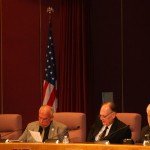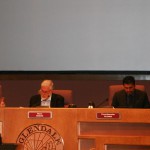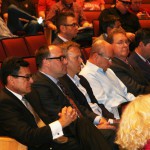- Slug: Sports-Coyotes Deal,900
- Photos available (thumbnails, captions below)
By MICHAEL NOWELS
Cronkite News
GLENDALE – Mayor Jerry Weiers said he believes Friday’s vote to accept a new lease agreement with the Arizona Coyotes is a sign of a brighter future for the city of Glendale.
“Our city’s had a long history of making some really bad decisions and I think this council has proven that we’re not going to do that any longer,” Weiers said Friday.
The comments came after an emergency meeting in which the council voted unanimously to accept a restructured lease agreement with the Coyotes for city-owned Gila River Arena.
The council had voted June 10 to void the original lease.
The new lease expires in 2017 – the old deal ran through 2028 – and decreases the city’s yearly obligation to the team from $15 million to $6.5 million.
That cut would be offset by the team taking control of some revenue that previously went to the city.
In the amended agreement, IceArizona, the group that owns the Coyotes, will receive revenue from parking and ticket surcharges for all events that are not city-sponsored, including Coyotes games and concerts.
Coyotes co-owner, president and CEO Anthony LeBlanc said those funds would have generated a bit less than $15 million last year for the team. But he said he likes taking this chance and believes it could be a better deal for the team in the long run.
“They wanted cost certainty and this provides it to them,” LeBlanc said. “We’re happy to take on the risk because we’re as bullish as we are on the market.”
LeBlanc said the Coyotes wanted longer-term security but were willing to accept a short-term deal and take the chance to bet on their own viability.
The length of the deal had some wondering whether the team would stay in Glendale long-term.
“I think everybody’s getting hung up on a two-year deal. The two-year deal simply allows us time to work this out in the future,” Weiers said. “There’s not a councilmember that doesn’t want the Coyotes to stay here. We all do. We just need a situation that benefits all of us and I think this does that.”
“The important thing is now to make sure that our relationship, especially with the mayor and the council and the city going forward, is again on solid ground. Then we’ll start talking about creating a contract that is sustainable long-term,” Wood said.
As part of the agreement, the Coyotes severed ties with general counsel Craig Tindall, whose status as a former city attorney was at the center of the city council’s decision to void the initial contract based on a state conflict-of-interest statute.
LeBlanc downplayed the importance of that stipulation, recalling that Tindall had offered to leave the team if he had become too much of a distraction. He also said that Tindall’s contract with the team was set to expire next month regardless of this decision.
“We understand that the city’s opinion on this situation is what it is,” LeBlanc said. “It certainly wasn’t an admission of guilt on either side. (Tindall) was feeling a little bit beat up. The city certainly made it clear that it was something that they felt was the right thing to do. It was a tough thing to do. Craig’s become a very good friend.”
The agreement also prohibits the Coyotes from working with former Assistant City Manager Julie Frisoni. Frisoni, who left the city in March to start her own public relations firm, consulted on the team’s since-withdrawn bid to bring the 2018 International Ice Hockey Federation World Junior Championship to Glendale.
The lease situation also had other effects. LeBlanc said that some players’ agents refused to hear offers from the Coyotes because of the uncertainty.
Team officials got serious when right winger Mikkel Boedker, who was a restricted free agent this summer, would not agree to any contract longer than one season, citing the instability. Boedker signed a one-year, $3.75 million deal July 7.
“We got together as an ownership group and said, ‘This is not a way we can run a hockey team,’” LeBlanc said. “We cannot have a situation where a guy like Mikkel, who is arguably one of our young upcoming superstars (is signing a one-year contract). We have to have the ability to build that team.”
The interaction between city officials and team representatives had been tense over the last six weeks, but LeBlanc and Weiers both said that it was all about business and they have a strong personal relationship.
LeBlanc said at the meeting that he has not been as communicative as he should have been, proposing that the two sides have quarterly meetings to keep communication up.
“The mayor and I have promised each other we’ll get together for lunch,” LeBlanc said. “He mentioned that he’s got a bottle of Crown Royal up in his office that I’m certainly going to help him tap into. Jerry and I like each other. We’re friends. Business is business and we’re looking forward to the next step.”


